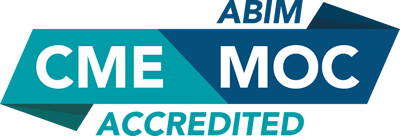
COURSE CREDITS & HOURS
14 AMA PRA Category 1 Credits™14 ACPE Credits
14.0 Contact Hours
14 (part II) MOC points in medical knowledge in the American Board of Internal Medicine's (ABIM) Maintenance of Certification (MOC) program
4½ Hours of Pharmacology for NPs
COURSE FEES
TARGET AUDIENCE
PROGRAM PURPOSE
- Obesity Management: Update on Latest Guidelines and Evidence, and Practical Tips
- Synthesize the current guidelines on obesity management in a clinically relevant fashion.
- Use evidence based medicine to debunk popular myths related to diet, activity and behavior as they relate to the treatment of obesity.
- Synthesize the effectiveness and risks of each weight loss method for patients
- Manage obesity in a 15-minute outpatient visit
- Pain management: guidelines for opioid risk mitigation and overdose resuscitation
- Identify recent trends in use of opioids and deaths from overdose.
- Describe recently published clinical guidelines on the use of opioids from the Center for Disease Control, the American Heart Association, and the Substance Abuse and Mental Health Services Administration, including risk mitigation strategies and the steps of opioid overdose resuscitation.
- Apply the knowledge gained to an evolving case involving opioid prescription.
- Update on evidence-based recommendations for lifestyle management of common diseases
- Synthesize current evidence and recommendations for lifestyle management of common primary care chronic diseases
- Apply lifestyle medicine principles to clinical case management
- Prevention of medical errors by performing an appropriate written and verbal handoff of care
- Summarize the components of optimal verbal and written handoffs
- Synthesize the roles of effective handoffs and the relationship with medical errors
- Describe the characteristics, content and sequence of effective handoffs
- Apply effective handoffs strategies to improve a clinical handoff scenario
- Health promotion: What are the recommendations and evidence? How to motivate patients for behavior change?
- Synthesize the updated recommendations and evidence for health promotion
- Demonstrate techniques for motivating patients for behavior change
- Apply the knowledge gained to a clinical scenario
- Current guidelines for screening patients at risk for type 1 and 2 diabetes
- Summarize current guidelines for screening patients for type 1 and 2 diabetes
- Apply the knowledge gained to relevant clinical scenarios
- Update on USPTFS recommendations for screening in primary care
- Synthesize current US PTFS guidelines for screening in primary care
- Apply the knowledge gained to relevant clinical scenarios
- Restless Leg Syndrome
- Participants should be able to diagnose restless leg syndrome and identify treatment options.
- Insomnia
- Participants should be able to select appropriate therapy for insomnia.
- Narcolepsy
- Participants should be able to identify narcolepsy in patient with hypersomnia.
- Obstructive Sleep Apnea
- Participants should be able to describe obstructive sleep apnea and list treatment options.
- Cough
- Participants should be able to summarize common causes of cough and classify between acute and chronic cough.
- Asthma
- Participants should be able to select between various asthma treatment options.
- COPD
- Participants should be able to devise pharmacologic treatment plan for patient with COPD.

































